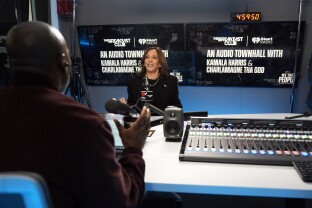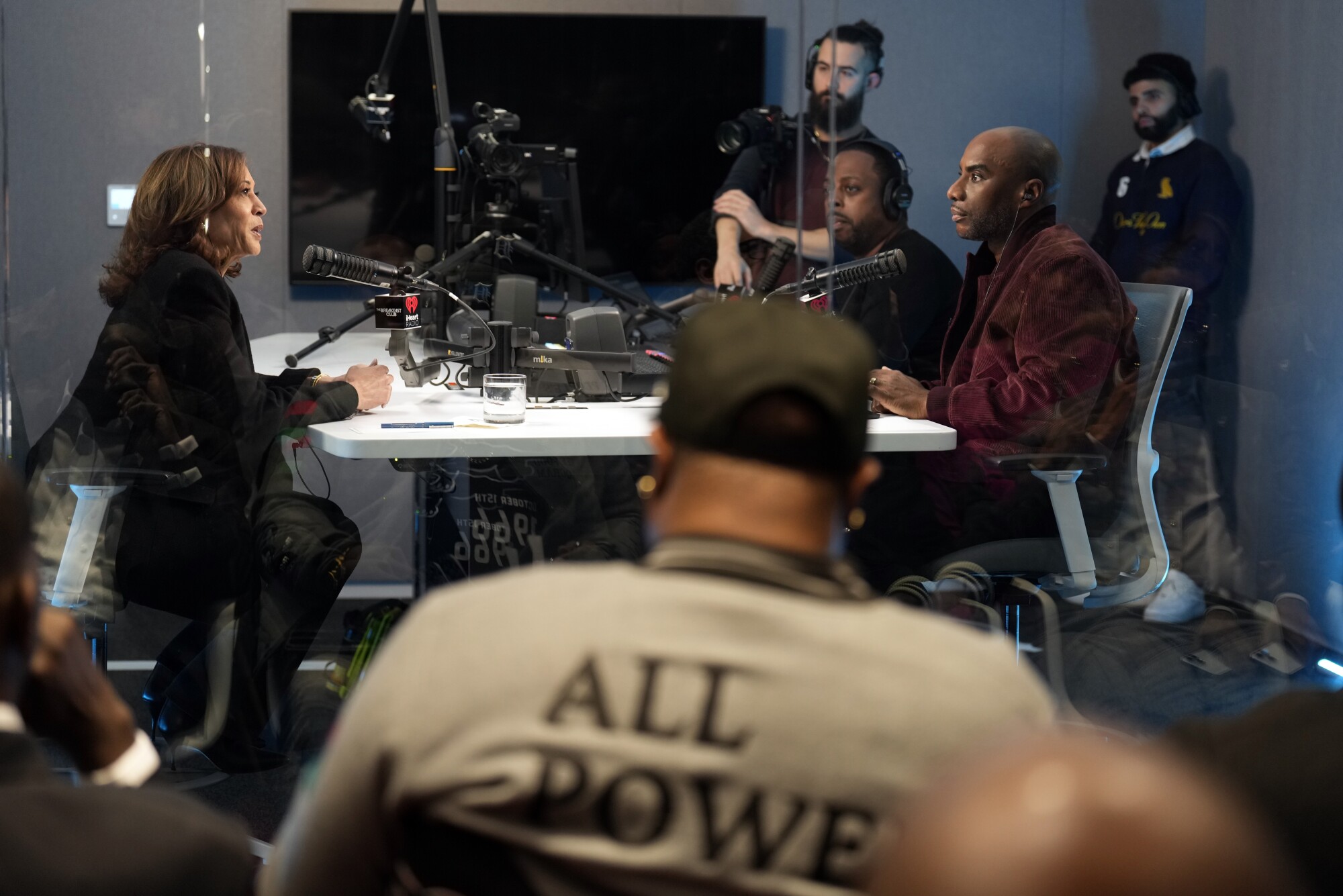During a radio town hall in Detroit on Tuesday, Kamala Harris made one of her most direct appeals to Black voters yet, casting Donald Trump as a unique threat to Black Americans while highlighting policies she hopes can win over a key voting bloc that’s been drifting toward the former president.
In an hour-long conversation with “The Breakfast Club” host Charlamagne Tha God, Harris called attention to Trump’s support for stop-and-frisk policies as well as recent reporting that Trump sent COVID tests to Russian President Vladimir Putin while Black Americans were “dying by the hundreds.”
“The man is really quite weak,” Harris said. “It’s a sign of weakness that you want to please dictators and seek their flattery and favor. It’s a sign of weakness that you would demean America’s military and America’s service members. This man is weak and he is unfit.”
Harris also agreed with Charlamagne’s assessment that Trump’s campaign is “about fascism.”
“Why can’t we just say it?” Charlamagne asked.
“Yes, we can say that,” Harris said, adding that Trump insists on “taking us backward.”
In her pitch, Harris focused on the so-called “kitchen table” issues facing Black Americans, arguing that a second Trump administration would be worse on housing affordability and drug pricing.
“What is at stake is truly profound and historic,” Harris said. “It is about, some people would say, this lofty notion of supporting and preserving our democracy, but it is about real issues that affect people every day, like whether we’re going to maintain a $35 cap on insulin for our seniors, whether we’re going to continue to allow Medicare to negotiate drug prices to bring them down.”
Harris also blasted Trump for his role in overturning abortion protections, with Harris arguing that state abortion bans have disproportionately harmed Black women in the South.
“Every state except Virginia in the South has an abortion ban,” Harris said. “You know where the majority of black women live? In the South, in those same states that have some of the highest rates of Black maternal mortality.”
Harris continued to frame the race as a choice between her, who she argues is focused on helping Americans, and Trump, who she says is focused on helping himself.
When Charlamagne asked Harris why she allows Trump to refer to her as the “border czar,” even though that’s not actually a role she played in the Biden administration, Harris was dismissive of Trump.
“If I responded to every name he called me, I wouldn’t be focused on the things that actually help the American people. And that’s my focus,” she said.
The vice president conceded that she still has work to do to win over voters unfamiliar with her policy goals, but she said she was confident her efforts would see her defeat Trump in November.
“Look, I’ve been in this race 70 days,” Harris said. “Some people are just getting to know me. Other people have known me, and … I feel very strongly I need to earn every vote, which is why I’m here having this candid conversation with you and your listeners.”
Harris highlighted wins such as an increase in funding for historically Black colleges and universities and a 50% reduction of Black child poverty during her and Joe Biden’s first year in office.
She also made a direct appeal to the Black voters who are considering sitting out the election.
“We should never sit back and say, ‘OK, I’m not gonna vote because everything hasn’t been solved,’” she said. “I share a desire that everything should be solved.”
“But,” she continued, “that shouldn’t stand in the way of us also knowing we can participate in a process that’s about improving things.”
Harris’ “Breakfast Club” appearance comes as her campaign struggles to earn the same support among Black voters — particularly Black men — as President Biden had in 2020.
Over 90% of Black voters cast their ballots for Biden and Harris in 2020, comprising 19% of all votes cast for the ticket. That was roughly on par with the share of the Black vote that Hillary Clinton earned in 2016.
This time around, however, support from Black voters appears to have fallen by several percentage points — even as Harris maintains a commanding lead over Trump with that bloc of the electorate.
A recent New York Times/Siena College poll put Black voter support for Harris at 78%, compared to Trump’s 15% — a significant drop for the vice president compared to the last two Democratic presidential nominees.
Last week, former President Barack Obama also made a direct appeal to Black men at a rally in Pittsburgh.
“My understanding … is that we have not yet seen the same kinds of energy and turnout in all quarters of our neighborhoods and communities as we saw when I was running,” Obama said. “I’m speaking to men directly — part of it makes me think that, well, you just aren’t feeling the idea of having a woman as president, and you’re coming up with other alternatives and other reasons for that.”
Charlamagne himself had declined to endorse President Biden in his reelection bid — calling both him and Trump “trash” — but he quickly endorsed Harris after Biden exited the race.
Still, his comments on the radio show have at times come at a detriment to Harris’ campaign.
Last month, Charlamagne praised an ad from the Trump campaign that highlighted Harris’ past support for taxpayer-funded gender-affirming surgeries for federal prisoners.
“That ad was effective,” Charlamagne said during an episode of “The Breakfast Club.” “I was like, ‘Hell no, I don’t want my taxpayer dollars going to that.’”
In turn, the Trump campaign cut an ad featuring Charlamagne’s remarks that garnered millions of views on social media. (Charlamagne declined to bring up the specific criticism during the town hall.)
Harris acknowledged the close nature of the race but said she was confident she and Tim Walz would eke out a win in the end.
“When I go to bed at night … in addition to my prayers will ask, ‘Have I done everything I could do today?’” Harris said. “This is a margin-of-error race. It’s tight. I’m gonna win. I’m gonna win. But it’s tight.”
—
Mark Alfred is a NOTUS reporter and an Allbritton Journalism Institute fellow.
Sign in
Log into your free account with your email. Don’t have one?
Check your email for a one-time code.
We sent a 4-digit code to . Enter the pin to confirm your account.
New code will be available in 1:00
Let’s try this again.
We encountered an error with the passcode sent to . Please reenter your email.



